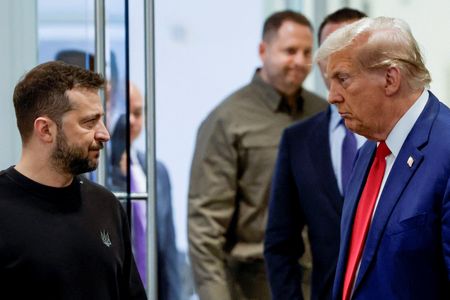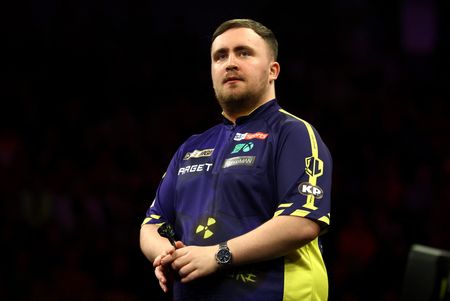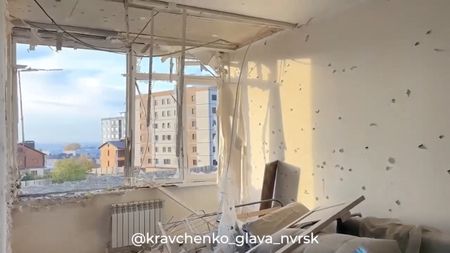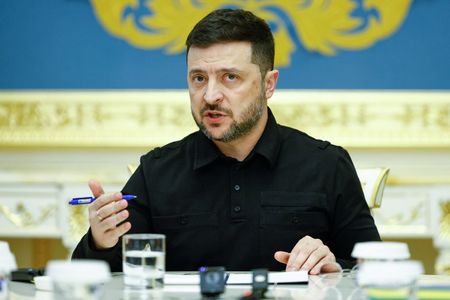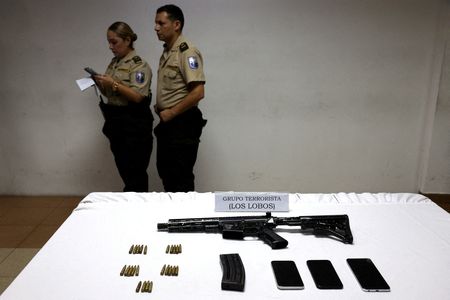By Dmitry Antonov and Andrew Osborn
MOSCOW (Reuters) – The Kremlin offered Donald Trump support in his standoff with Volodymyr Zelenskiy, accusing the Ukrainian president of making “inadmissible” remarks about world leaders as a Russian official said he was stunned by how fast the U.S stance had shifted.
Trump’s return to the presidency has begun to warm moribund U.S.-Russia ties, which fell to their lowest point since the 1962 Cuban missile crisis under Joe Biden, Trump’s predecessor, due to Moscow’s war in Ukraine.
By contrast, Kyiv’s ties with Washington, crucial to its battlefield defence against Russia, have begun to fracture under Trump with tensions around a potential U.S. deal to exploit Ukraine’s natural resources and over a U.S. decision to hold two-way talks with Russia about Ukraine without Kyiv.
Zelenskiy on Wednesday accused Trump of living in a “disinformation bubble” after Trump called him “a dictator” and dismissed as false a claim by Trump that his popularity rating was just 4%.
The Kremlin weighed in on Trump’s side on Thursday.
“The rhetoric of Zelenskiy and many representatives of the Kyiv regime leaves much to be desired. The fact that Zelenskiy’s rating is falling is an absolutely obvious trend,” Kremlin spokesman Dmitry Peskov told reporters.
Peskov said he didn’t want to get into details on numbers though when it came to discussing Zelenskiy’s popularity, which opinion polls in Ukraine show is above 50%.
‘UNACCEPTABLE’ CRITICISM
“Often representatives of the Ukrainian regime, especially in recent months, allow themselves to say absolutely unacceptable things about heads of other states,” said Peskov, without providing examples.
“We see that there are certain differences between Washington and Kyiv,” he added, accusing Ukraine of spending foreign taxpayers’ money in an uncontrolled way and balking at attempts to hold it to account for funds spent in the past.
That criticism, which Ukraine has repeatedly denied when it has come from U.S. politicians, is part of a pattern which has seen Russian politicians from President Vladimir Putin on down sometimes offering support for Trump administration talking points.
Trump’s swift move to repair ties with Moscow, his equally fast falling out with Kyiv and Vice President JD Vance’s sharp criticism of Europe at the Munich Security Conference have left traditional U.S. allies stunned and scrambling to forge a common response. Britain has said it would be willing to send troops to support Ukraine, while Spanish Prime Minister Pedro Sanchez plans to visit Kyiv on Monday to show his country’s support for Zelenskiy and Ukrainian democracy.
Dmitry Medvedev, Russia’s former president and now deputy chairman of Russia’s Security Council, said he was stunned at how quickly Trump’s stance on Ukraine had evolved.
“‘A Dictator without Elections, Zelenskyy better move fast or he is not going to have a Country left.’ If you’d told me just three months ago that these were the words of the US president, I would have laughed out loud,” Medvedev wrote on X in English.
“Trump is 200 percent right,” said Medvedev.
With a possible Putin-Trump meeting on the agenda, U.S.-Russia talks on Ukraine in the pipeline, and a souring of ties between Kyiv and Washington, there are cautious hopes in Moscow that it may be possible to end the war on many of its own terms.
Zelenskiy has long been seen by the Russian leadership as a potential obstacle to getting an agreement on ending the war because he has been so vociferous in his opposition to Moscow and is seen as unbending when it comes to his terms for a potential settlement.
Putin, and now Trump, have suggested Zelenskiy must hold an election to renew his mandate given that an election due last year was not held because of martial law. Zelenskiy has said that it’s not the right moment to hold an election.
Some hardliners in Russia, like Konstantin Malofeyev, a wealthy nationalist businessman, said Zelenskiy needs to hold and lose an election before a peace deal can be struck.
“Yes, the duped voters (of Ukraine) will still elect an anti-Russian president. But it won’t be Zelenskiy,” Malofeyev said on Telegram.
“The new Ukrainian authorities will be able to do a deal.”
(Reporting by Dmitry Antonov in Moscow and Andrew Osborn in London; editing by Sharon Singleton)

